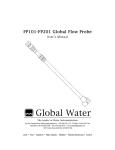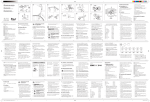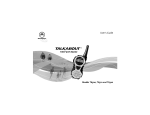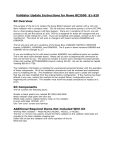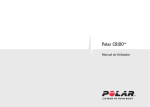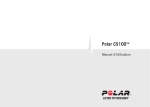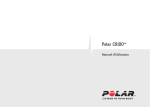Download BuckMaster FP-201 User`s manual
Transcript
Global Water 800-876-1172 • globalw.com FP101-FP201 Global Flow Probe User’s Manual The Leader in Water Instrumentation Visit Our Complete Online Catalog www.globalw.com Call (800) 876-1172, 7:30 AM to 4 PM Pacific Time International: US (916) 638-3429 • FAX: (916) 638-3270 E-mail: [email protected] 11390 Amalgam Way, Gold River CA 95670 USA Level • Flow • Samplers • Water Quality • Weather • Remote Monitoring • Control 1/20/04 1 Global Water 800-876-1172 • globalw.com Congratulations on your purchase of the Global Water Flow Probe. This instrument has been quality tested and approved for providing accurate and reliable measurements. We are confident that you will find the sensor to be a valuable asset for your application. Should you require assistance, our technical staff will be happy to help. Table of Contents I. Checklist • • • • • • Page 3 II. Inspection • • • • • • 3 III. General Instructions • • • • • 4 IV. Average Velocity • • • • • 5 V. Computer Operation • • • • • 7 VI. Specifications • • • • • • 8 VII. Maintenance • • • • • • 8 VIII. Troubleshooting • • • • • • 10 IX. Warranty • • • • • • 12 X. Appendix A: Computer Set-Up • • • • 13 XI. Appendix B: Calculations for Flow in Partially Filled Pipes • • * Copyright Global Water Instrumentation, Inc. 2004 2 15 Global Water 800-876-1172 • globalw.com I. Flow Probe Checklist a. Flow Probe b. Flow Probe Manual II. Inspection a. Your Flow Probe was carefully inspected and certified by our Quality Assurance Team before shipping. If any damage has occurred during shipping, please notify Global Water Instrumentation, Inc. and file a claim with the carrier involved. Use the checklist to ensure that you have received everything needed to operate the Flow Probe. 3 Global Water 800-876-1172 • globalw.com III. General Instructions a. Make sure the Flow Probe’s propeller turns freely by blowing strongly on the prop. b. Point the propeller directly into the flow you wish to measure. Face the arrow inside the prop housing downstream. The FP101 probe handle is a two piece rod expandable from 3’ to 6’, and the FP201 is a three section rod expandable from 5’ to 15’. To expand the rod for correct placement in flow, loosen the locking nut on the handle, pulling out the top piece and retightening the nut. c. Use the bottom button to scroll through the functions until “AVGSPEED” appears. The top number is the instantaneous velocity to the nearest .5 ft/second. The lower display is the average velocity. Pressing the top button for 3 seconds will clear the average and start a new reading. While taking an average reading the maximum velocity will also be recorded. Pushing the bottom button until “MAXSPEED” is displayed causes the lower display to indicate this value. While on this screen, pressing the top button for 3 seconds will clear this value. While on the average or maximum screens pressing the top button for 5 seconds will clear both of these functions. d. To make a measurement, place the propeller at the desired measuring point and hold the top button for 3 seconds to clear the value or 5 seconds to clear both average and maximum values. Hold the probe in place until the reading becomes steady and remove the probe from the water. The average and maximum velocities remain in their respective screens. These values are only updated while the propeller is turning. See the Average Velocity section for more information. e. Measure/calculate the cross-sectional area of your flow stream in square feet. If you are measuring flow in round pipes, measure the depth of water and use the enclosed tables to determine crosssectional area (see Appendix B: Calculations for Flow in Partially Filled Pipes). If you are measuring flow in another channel type, manually measure water depth at several points across the flow. These measurements are most easily recorded by drawing a diagram on graph paper with a scale of 1 square foot per graph paper square. Cross-sectional area (in square feet) can then be found by counting the number of squares in the stream. 4 Global Water 800-876-1172 • globalw.com f. The average velocity (calculated with the Flow Probe in feet/second) times the cross-sectional area (square feet) equals flow in cubic feet per second (cfs), or Q = V x A. g. If the propeller gets fouled while measuring flow, clean it until the prop turns freely and start over. IV. Average Velocity The Flow Probe is used to measure the average water velocity. Streamflow velocity varies for two reasons: a. The velocities vary throughout the flow’s cross-section. In general, the velocities are greater in the center of the flow and less near the bottom and sides of the channel. b. The water surges in velocity with time. In a smooth running stream, the velocity at a specific point can easily vary 1-2 feet per second over the period of a minute. This pulsating or surging of flow should be averaged to obtain an accurate average flow reading (leave the probe in the flow through a series of flow surges). The Flow Probe can be used in three ways to determine average velocity in a stream. a. For small streams and pipes, the probe can be moved slowly and smoothly throughout the flow during average velocity measurement. Move the probe smoothly and evenly back and forth from top to bottom of the flow so that the probe stays at each point in the flow for approximately the same amount of time. Keep moving the probe for 20-40 seconds to obtain an accurate average value that accounts for surging. (Move the probe as if you were spray painting and attempting to get an even coat of paint over the entire surface.) 5 Global Water 800-876-1172 • globalw.com The Flow Probe uses true velocity averaging. When the average and maximum velocities are zeroed by pushing the top button, a running average is started. As long as the probe remains in the flow, the averaging continues. One reading is taken per second, and a continuous average is displayed. For example, after 10 seconds, 10 readings are totaled and then divided by 10 and this average is displayed. Once the average reading becomes steady, the true average velocity of the stream is obtained. When you pull the probe from the water, this average value is frozen on the display until it is reset. b. For larger streams and rivers where the Flow Probe can’t easily be moved throughout the flow, divide the stream into subsections 2-3 feet wide. We recommend dividing subsections on your graph paper diagram of the flow profile. Run a measuring tape across the stream for reference. Obtain a vertical flow profile at the center of each subsection: zero the averaging function and move the Flow Probe vertically from the surface to the bottom, up and down, slowly and smoothly for 20-40 seconds to obtain a good average. The average velocity (obtained with the Flow Probe) times the area of the subsection (use your graph paper diagram) equals the flow for the subsection (Q=VxA).Once the flow of each subsection is obtained, add all of the subsection flows to obtain the Total Streamflow. c. For the USGS “6 tens method”, the Flow Probe is placed at the center of the subsection at a depth from the surface of 0.6 of the total depth. The Flow Probe is held in place and the average velocity is obtained over a period of 40 seconds. The 0.6 depth is assumed to be the average velocity point for the vertical profile. Therefore, this average is similar to that obtained in technique 2 (above) however; we feel that technique 2 is more accurate. 6 Global Water 800-876-1172 • globalw.com V. Computer Operation a. The Flow Probe is calibrated at the factory. When you receive the product, you may wish to set the computer’s clock (see Computer Setup), otherwise you should not have to alter any of your computer settings. You will have to recalibrate the computer when you change the unit’s battery (See Appendix A: Computer Setup). Normal battery life for the Flow Probe is 3 years or more. b. The Flow Probe computer has a simple 2-button operation. The bottom button scrolls between functions and the top button resets the function’s value. Pressing the top button for 3 seconds zeros the average and maximum velocities. With a little practice, the buttons can be pushed with the hand holding the top of the probe. c. The computer functions are as follows: • Velocity: The upper display number is the instantaneous velocity to the nearest .5 foot (or meter, depending on units being used) per second. • The lower display number is used for the following functions: average velocity(AVGSPEED), maximum velocity(MAXSPEED), stop watch(STPWATCH) and CLOCK. • The bottom button scrolls between these functions, and also DIST/DAY, RIDETIME, TRIP UP, and TOTALODO which are not used for this application. • Push the top button for 3 seconds to reset the displayed function. Push for 5 seconds to reset all velocity functions. • Stop watch: While STPWATCH is displayed, pressing the top button once will start the stop watch. Pressing a second time stops the watch. Holding the button for 3 seconds clears it. • Clock: The computer returns to the clock function after a period of inactivity for the probe. 7 Global Water 800-876-1172 • globalw.com VI. Specifications Range: Accuracy: Averaging: Display: Sensor Type: Weight: Size: Materials: Power: Operating Temperature: Carrying Case: 0.3-15 FPS (0.1-4.5 MPS) 0.1 FPS True digital running average. Readings taken once per second. LCD Protected Turbo-Prop propeller with electro-magnetic pickup. 2 Lbs (10 lbs. U.S., 14 lbs. international shipping weight) Length: FP101 3' to 6'; FP201 5' to 15' PVC, anodized aluminum, stainless steel bearing Internal watch type batteries/1 year life 0° to 120° F The Flow Probe is shipped in a padded carrying case. VII. Maintenance a. Probe Handle: When the Flow Probe expansion joint becomes submerged, water will enter the Probe handle. After use, dry the Probe by separating the two handle sections, draining the water inside the Probe handle, and letting the handle dry out in a warm place before reassembling. The Flow Probe handle can be cleaned with mild soap and water. DO NOT submerge the top of the pole and the computer. If the computer gets submerged, remove it from the Flow Probe, DRY IMMEDIATELY with a soft cloth; remove the battery and place in a warm place overnight to dry. b. Battery Replacement: The Computer is held onto the head of the Probe by a twist lock connection. To remove, turn Computer ¼ turn to the left and pull off. To remove the battery use a small coin to twist the battery cover on 8 Global Water 800-876-1172 • globalw.com the back of the computer, ¼ turn to the left. Replace battery, + side toward battery cover, using a CR2032, 3 volt lithium cell. After replacing battery the calibration numbers will require resetting. (See Appendix A: Computer Setup) c. Cleaning: Make sure the Turbo Prop turns freely before and after your measurements. Blow on the prop in the direction of flow. The prop should turn freely. If not, rinse the probe in clean water and remove any visible strings or hair materials from the prop bearing. This should correct the problem. If the prop still does not turn freely, remove the prop screw and the prop, and wash them in clean water or soap and water. Replace prop and screw. Tighten screw firmly but make sure prop still spins freely. 9 Global Water 800-876-1172 • globalw.com VIII. Trouble Shooting Issue: Computer reading incorrectly a. Blow on the propeller. The prop should spin freely and make a noise (chatter) when you blow on it. The prop should be loose on the shaft when you push it with your finger. If prop does not spin freely, rinse it with clean water or soak it in mild soapy water. b. A small metal magnet covered with clear adhesive is installed on the back side of the prop on one blade. Be sure the magnet is in place and has not been removed. This magnet is necessary to make the signal for the computer. c. Remove the computer holder from the pole handle by pulling the holder up away from the pole. The holder should come off with a popping sound. Make sure there is no moisture around the plug or socket. If the plug and socket are wet, dry the parts off and place both in a warm place overnight. Push the computer holder back on to handle HARD until you hear a "pop" or "snap" sound. If you don't hear this sound, the holder is not on all the way or you have a defective socket connector. Zero the "av" mode and blow on the prop for 5 to 7 seconds. You should see a number in "av" if the unit is working. d. The computer can be removed from the holder by turning it ¼ turn to the left and lifting. Check the two electrical contacts on computer holder and the mating spring contacts on the computer. Make sure they are clean and dry. e. Reinstall the computer on the computer head in the opposite manner that it was removed. Spin the propeller, by blowing on it, and check for an average reading. If there is still no reading contact Global Water. f. If the display becomes weak or does not light up at all, replace the battery. Other issues a. Call Global Water for tech support: 800-876-1172 or 916-638-3429 (many problems can be solved over the phone). Fax: 916-638-3270 or Email: [email protected]. When calling for tech support, please have the following information ready; 10 Global Water 800-876-1172 • globalw.com 1. 2. 3. 4. 5. Model #. Unit serial number. P.O.# the equipment was purchased on. Our sales number or the invoice number. Repair instructions and/or specific problems relating to the product. Be prepared to describe the problem you are experiencing including specific details of the application, installation, and any additional pertinent information. b. In the event that the equipment needs to be returned to the factory for any reason, please call to obtain a RMA# (Return Material Authorization). Do not return items without a RMA# displayed on the outside of the package. Clean and decontaminate the FP101/201 if necessary. Include a written statement describing the problems. Send the package with shipping prepaid to our factory address. Insure your shipment; Global Water’s warranty does not cover damage incurred during transit. 11 Global Water 800-876-1172 • globalw.com IX. Warranty c. Global Water Instrumentation, Inc. warrants that its products are free from defects in material and workmanship under normal use and service for a period of one year from date of shipment from factory. Global Water’s obligations under this warranty are limited to, at Global Water’s option: (I) replacing or (II) repairing; any products determined to be defective. In no case shall Global Water’s liability exceed the products original purchase price. This warranty does not apply to any equipment that has been repaired or altered, except by Global Water Instrumentation, Inc., or which has been subject to misuse, negligence or accident. It is expressly agreed that this warranty will be in lieu of all warranties of fitness and in lieu of the warranty of merchantability. d. The warranty begins on the date of your invoice. 12 Global Water 800-876-1172 • globalw.com X. Appendix A: Computer Setup The BC1200 has the capability to switch between 2 different calibration factors. To change between the calibrations remove the computer from the flow probe head by twisting 45 degrees counter clockwise and lifting. The indented gray button in the upper left corner on the back is to switch between CAL I and CAL II. In the upper left corner of the display, I is displayed for CAL I and II is displayed for CAL II. Note: I = ft/sec, calibration # = 0053 II = m/sec, calibration # = 0016 The indented gray button on the upper right is used to enter the calibration mode. Press and hold it for 5 seconds to enter calibration mode. TO RESET THE CALIBRATION: (Calibration #’s are factory set. Resetting is only required after changing the battery.) • Press bottom button until CLOCK or TOTALODO is not displayed on screen. • Press the left indented gray button to select CAL I. • Turn computer over and press and hold the right indented gray button for 5 seconds and “set language” flashes on display. • Press top button to select language. • Press bottom button to accept. • Press top button until “SET M” is displayed. • Press bottom button to accept. The calibration factor is now displayed. • Pressing the top button will change the value of the flashing digit. • Pressing the bottom button will accept this value and move to the next digit. • Set the calibration factors as follows: o Feet/second: 0053 (CAL I) o Meters/second: 0016 (CAL II) • Press indented right button on back for one second to store. Repeat above procedure for Cal II. (Only the cal number will be required) 13 Global Water 800-876-1172 • globalw.com (NOTE: after battery replacement and additional screen displaying SET ODO will follow the forth digit of the cal number. Ignore this and press the indented gray button to store settings) TO SET CLOCK • Press bottom button until clock appears at the bottom of the screen. • Turn computer over and press and hold the right indented gray set button (S) for 5 seconds or until clock flashes. • Press top button until hour is reached. • Press bottom button to move to minutes. • Press top button until desired number is reached. • Press bottom button to move to single minutes. • Press top button until desired single minute is reached. • Turn computer over and press right indented gray set button for 1 second to save. 14 Global Water 800-876-1172 • globalw.com XI. Appendix B: Calculations for Flow in Partially Filled Pipes B 0.01 0.02 0.03 0.04 0.05 0.06 0.07 0.08 0.09 0.10 0.11 0.12 0.13 0.14 0.15 0.16 0.17 0.18 0.19 0.20 0.21 0.22 0.23 0.24 0.25 0.26 0.27 0.28 0.29 0.30 0.31 0.32 0.33 0.34 0.35 0.36 0.37 0.38 0.39 0.40 0.41 0.42 0.43 0.44 0.45 0.46 0.47 0.48 0.49 0.50 C 0.0013 0.0037 0.0069 0.0105 0.0147 0.0192 0.0242 0.0294 0.0350 0.0409 0.0470 0.0534 0.0600 0.0668 0.0739 0.0811 0.0885 0.0961 0.1039 0.1118 0.1199 0.1281 0.1365 0.1449 0.1535 0.1623 0.1711 0.1800 0.1890 0.1982 0.2074 0.2167 0.2266 0.2355 0.2450 0.2546 0.2644 0.2743 0.2836 0.2934 0.3032 0.3130 0.3229 0.3328 0.3428 0.3527 0.3627 0.3727 0.3827 0.3927 B 0.51 0.52 0.53 0.54 0.55 0.56 0.57 0.58 0.59 0.60 0.61 0.62 0.63 0.64 0.65 0.66 0.67 0.68 0.69 0.70 0.71 0.72 0.73 0.74 0.75 0.76 0.77 0.78 0.79 0.80 0.81 0.82 0.83 0.84 0.85 0.86 0.87 0.88 0.89 0.90 0.91 0.92 0.93 0.94 0.95 0.96 0.97 0.98 0.99 1.00 C 0.4027 0.4127 0.4227 0.4327 0.4426 0.4526 0.4625 0.4723 0.4822 0.4920 0.5018 0.5115 0.5212 0.5308 0.5404 0.5499 0.5594 0.5687 0.5780 0.5872 0.5964 0.6054 0.6143 0.6231 0.6318 0.6404 0.6489 0.6573 0.6655 0.6736 0.6815 0.6893 0.6969 0.7043 0.7115 0.7186 0.7254 0.7320 0.7384 0.7445 0.7504 0.7560 0.7612 0.7662 0.7707 0.7749 0.7785 0.7816 0.7841 0.7854 H= Height of water; D= Diameter of pipe (in feet) H/D = Column B Read Column C adjacent to your pipe’s B C x D2 = Filled area, A (sq.ft. ) A x Average Velocity = Volumetric flow (CFS) CFS x 448.83 = Gallons/minute (GPM) GPM x 1440 = Gallons/day (GPD) 15















